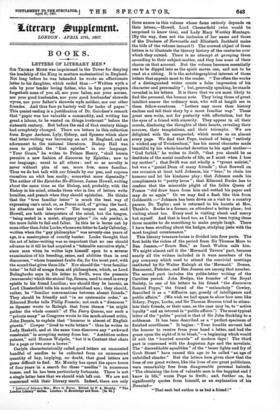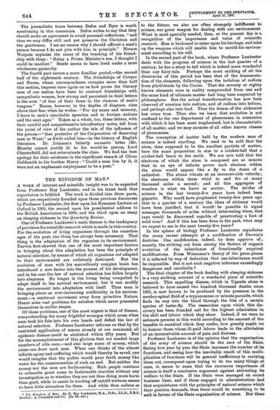BOOKS.
LETTERS OF LITERARY MEN.*
SIR Tnocuis MORE was imprisoned in the Tower for denying the headship of the King in matters ecclesiastical in England. Not long before he was beheaded he wrote an affectionate letter to his daughter, which ended thus:—" Written wyth a cola by your tender loving father, who in bye pore prayers forgetteth none of you all, nor your babes, nor your nurses, nor your good husbandes, nor your good husbandea' shrewde wyvea, nor your father's shrewde wyfe neither, nor our other friendea. And thus fare ye hartely well for lacke of paper." This quaint ending is a justification of Dr. Gairdner's remark that "paper was too valuable a commodity, and writing too great a labour, to be wasted on things irrelevant" before the sixteenth century. But before the end of that century things had completely changed. There are letters in this collection from Roger .Ascham, Lyly, Sidney, and Spenser which show that letter-writing was becoming an art in England, and an adornment to the national literature. Bishop Hall was soon to publish the " first epistles " in our language. "Your Grace," he writes to Prince Henry, "shall herein perceive a new fashion of discourse by Epistles; new to our language; usual to all others : and so as novelty is never without plea of use, more free, more familiar. Thus we do but talk with our friends by our pen, and express ourselves no whit less easily; somewhat more digestedly." The author of the Dpietelee Ho-Elianae, James Howell, writing about the same time as the Bishop, and, probably, with the Bishop in his mind, attacks those who in lieu of letters write homilies, and preach when they should epistolist+. He thinks that the "true familiar letter" is much the best way of expressing one's mind, or, as Burns said, of " giving the bard, his situation and his views." The tongue and pen, said Howell, are both interpreters of the mind, but the tongue, " being seated in a moist, slippery place " (in ud,o petite), is the more liable to fail and falter. In this he is borne out by none other than John Locke,whose own letter to Lady Calverley, written when the "gay philosopher" was seventy-one years of age, is a masterpiece of courtly banter. Locke thought that the art of letter-writing was so important that no one should advance to it till he bad acquired a "tolerable narrative style," since man when he writes lays himself open to a severer examination of his breeding, sense, and abilities than in oral discourses, " whose transient faults die, for the most part, with the sound that gives them life." Nor should the "true familiar letter" be full of scraps from old philosophers, which, as Lord Bolingbroke says in his letter, to Swift, were the presents (munueeuta) which the stoical fop, Seneca, used to send in every epistle to his friend Lueilius; nor should they be laconic, as Lord Chesterfield tells his much-epistolised son; they should, rather, be "familiar conversations between absent friends." They should be friendly and "in no systematic order," as Edmund Burke tells Philip Francis; not each a " discourse " as Spenser wrote to Raleigh that from thence " he might gather the whole conceit" of The. Peery Queene, nor such a "private essay" as Congreve wrote to the much-abused critic, John Dennis, to explain that " humour is almost of English growth." Cowper "lived to write letters " : thus he writes to Lady Hesketh, and at the same time disavows any " awkward constraint" in accepting money from her. "Ambition orders palaces," said Horace Walpole, " but it is Content that chats for a page or two over a bower."
Carlyle characteristically called good letters an uncounted handful of needles to be collected from an unmeasured quantity of hay, implying, no doubt, that good letters are gems difficult to find. Mr. Mumby has spent the spare hours of four-years in a search for these "needles" in numerous tomes, and he has been particularly fortunate. There is not a single letter here that we should wish left out. We are not concerned with their literary merit. Indeed, there are only
• rtrppTtmre./1s=tedbsA..Eurty. " The ivagieLovi0.zuik.dea[d three names in this volume whose fame entirely depends on their letters,—Howell, Lord Chesterfield (who would be surprised to know this), and Lady Mary Wortley Montagu. (By the way, does not the inclusion of her name and those of the Duchess of 'Newcastle and Elizabeth Inchbald make the title of the volume inexact?) The avowed object of these letters is to illustrate the literary history of the centuries over which they extend. There is no attempt at grouping them according to their subject-matter, and they lose none of their charm on that account. But the volume becomes essentially one to -be dipped into as the spirit moves one, and not to be read at a sitting. It is the autobiographical interest of these letters that appeals most to the reader. " Too often the works of a distinguished writer create a false impression of hie character and personality "; but, generally speaking, he stands revealed in his letters. It is there that we are most likely to find the personal, the human note. They bring those of great intellect nearer the ordinary man, who will at length see in them fellow-creatures. " Letters may more than history enclose and tell their story by a more familiar way." These great men write, not for posterity with affectation, but for the eyes of a friend with sincerity. They appear in all their moods, disclosing the thoughts of their hearts, revealing their sorrows, their temptations, and their triumphs. We are delighted with the unexpected, which meets us on almost every page. We find that Pope, instead of being "entirely a wicked asp of Twickenham," has his moral character made beautiful by his whole-hearted devotion to his aged mother—. "God forbid," he writes to Swift, "that you should be as destitute of the social comforts of life, as I must when I lose my mother"; that Swift was not wholly a "tyrant satirist," but was a " genial Dean of many friends"; that Boswell on one occasion at least told Johnson, his " bear," to chain his humour and let his kindness play; that Johnson sends his compliments to "pretty loves"; that Edmund Burke luta to confess that the miserable plight of the fallen Queen of France "did draw tears from him and wetted his paper and may do so again." Or we may find a flash like this from Goldsmith :—" Johnson has been down on a visit to a country parson, Dr. Taylor; and is returned to his haunts at Mrs. Thrale's. Burke is a farmer, en attendant a better place; but visiting about too. Every soul is visiting about and merry but myself. And that is hard too, as I have been trying these three months to do something to make people laugh. There I have been strolling about the hedges, studying jests with the most tragical countenance." This literary treasure-house is divided into four parte. The first holds the riches of the period from Sir Thomas More to Ben Jonson,—"Brave Ben," as Izaak Walton calls him. We might almost call it the Mermaid Tavern' part, because nearly all the writers included in it were members of the gay company which used to attend the convivial meetings instituted by Sir Walter Raleigh at the 'Mermaid.' Donne, Beaumont, Fletcher, and Ben Jonson are among that number. The second part includes the polite-letter writing of the Caroline period. John Evelyn, the founder of the Royal Society, in one of his letters to his friend "the discursive Samuel Pepys," the friend of the " melancholy " Cowley, described it as a " diffusive age, greedy of intelligence and public affairs." (We wish we had space to show how men like Sidney, Pepys, Locke, and Sir Thomas Browne tried to stimu. late their friends, or their sons, as the case may be, to " active loyalty" and an interest in "public affairs.") The moat typical letter of the "polite" period is that of Sir John Suckling to a nobleman. It has been described as a " perfect specimen of finished courtliness." It begins: "Your humble servant had the honour to receive 'from your hand a letter, and had the grace upon the sight of it to blush,"—a beginning which would ill suit the "hurried scrawls" of modern days! The third part is concerned with the Augustan Age and the novelists. The " discreditable squabbles " of the " lesser lights and fry of Grub Street" have caused this age to be called "an age of unbridled slander." But the letters here given show that the lives of our great writers, like the lives of our great politicians, were remarkably free from disagreeable personal hatreds. "The obtaining the love of valuable men is the happiest end I know in life," wrote Pope to Swift; and, further on, he significantly quotes from himself, as an explanation of his Dunciad-
" That each bad author is ea bad a friends " The journalistic truce between Defoe and Dyer is worth mentioning in this connexion. Defoe writes to say that they should make an agreement to avoid personal reflections, "and thus we may differ still, and yet preserve the Christian and the gentleman. I see no reason why I should affront a man's person because I do not join with him in principle." Horace Walpole explains the cause of the breaking of his friend- ship with Gray : "Being a Prime Minister's son, I thought I could be insolent." Steele seems to have lived under a most wholesome gynarchy.
The fourth part covers a more familiar period,—the second half of the eighteenth century. The friendships of Cowper and Burns, whose correspondence occupies more than half this section, impress once again on us how prone the literary men of our nation have been to contract friendships with sympathetic women, how strong and persistent in their letters is the note "of fear of their fame in the clamour of men's tongues." Bacon, however, in the depths of disgrace, rises above that fear when he writes: "For my name and memory, I leave to men's charitable speeches and to foreign nations and the next ages." Taken as a whole, too, these letters, with their careful and comprehensive introductory notes, tell from the point of view of the author the tale of the influence of the patron—" that protector of the Corporation of deserving men in Want," as Swift called him—in the history of English literature. Dr. Johnson's bitterly sarcastic letter (Mr. Mumby cannot justify it) to his would-be patron, Lord Chesterfield, did not exterminate the class. We find the best apology for their existence in the significant remark of Oliver Goldsmith to his brother Henry " Could a man live by it, it were not an unpleasant employment to be a poet."



























































 Previous page
Previous page